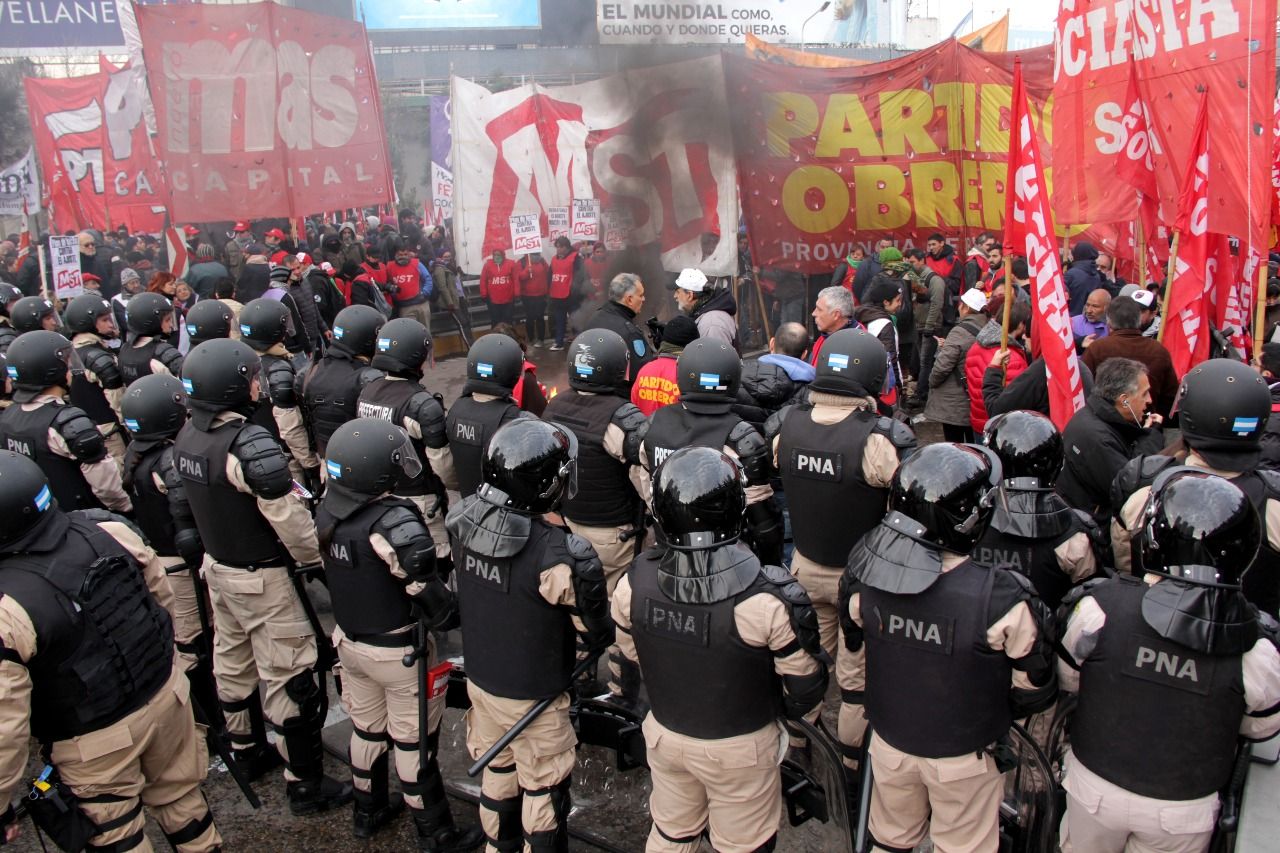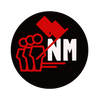Argentine Workers Strike Against the IMF
Argentine workers shut down the country on June 25th. We present our analysis and an important translation of a document by combative unionists.

Introduction:
A General Strike this Monday was a powerful reminder of the power of the working class to shut down the country. Buses, trains, the subway, flights, all were brought to a stop and transportation across the country was halted. The government declared that the strike was responsible for the loss of $28 billion in economic activity across the country. A value significantly greater than the wages of those who stopped work; demonstrating firmly who really produces value in society.
The strike called by the CGT (Argentina's largest labor confederation) leadership was essentially a passive strike which called upon workers to stay home without any major protest. Left-wing forces however led an effort to actively establish protests along major highways and at the city center. They confronted the police and succeeded in cutting off a number of highways and helping to ensure the effectiveness of the overall strike.
There are drastically different visions of the strike at stake between rank and file militants and the bureaucratic leaderships of the unions. The union leadership above all sees the strike as a negotiating tactic and one which it has been very reluctant to utilize. They wish to at most negotiate somewhat less drastic concessions than the ones which skyrocketing inflation have imposed on the working class. The general strike which took place Monday was supposed to happen much earlier, but was continually moved back or delayed. Only under mounting pressure from rank and file militants was the strike convoked.
The left and militant worker activists by contrast are fighting for the use of the strike as a tool to defeat the IMF and the reactionary austerity plans of Macri's government. The capacity of workers to almost totally shut down the country was demonstrated forcefully this Monday, workers have the ability to bring the Argentine economy to a halt and block the advance of the right.
The Saturday before the strike an important gathering of hundreds of left wing union militants and class struggle worker activists from across the country met in the suburbs of Lanus, at the outskirts of Buenos Aires. They voted the following resolutions which we have translated to English.
Resolutions of the National Plenary of Combative Unionism
1
We are those who in conferences and assemblies in our unions and workplaces pushed for the general strike of Monday June 25th; we fought for it to have a mass character and for it to be continued through a new strike of 36 hours with a mobilization to the Plaza de Mayo [Main plaza in Buenos Aires in front of the Presidential Palace].
The CGT [Main Union Federation] was forced to take this measure because of growing pressure from the rank and file. However it takes this action with the goal of letting off steam, of allowing the popular discontent to evaporate. What is needed is a plan to fight for the defeat of the government: a united and continuous workers response which goes beyond the collaborationism of the CGT, the testimonial actions of the CTA, the politics of Moyano, the Kirchneristas of Corriente Federal and the group Espacio 21F, which are focused on the vote in 2019.
The Union Bureaucracy is beholden to capitalist political sectors which have voted for Macri's austerity measures, which have implemented the budget cuts and fee hikes at the municipal and provincial level, which today support the agreement with the IMF despite pretending varying levels of opposition.
We have no confidence in the oppositions of the capitalist political parties nor in the union bureaucracy. We are the combative and democratic opposition to the union bureaucracy built to serve capitalist political parties. The Plenary of Lanus and its resolutions are an important point of support to struggle for a new leadership for the workers movement.
2
The effort to allow the Argentinian Military to engage in internal repression shows the fear of a new popular rebellion from a government which is debilitated and weakened by its own failures.
Argentina is a concentrated expression of the world capitalist crisis. The government of Macri is empowering this crisis through the contradictions of its own economic program based on the accumulation of foreign debt, the Financial Bicycle [term used for a speculative financial operation in which dollars are brought in, traded for pesos at high rates of interest, traded back into dollars and than withdrawn], and the robbery of our natural resources; in this way the government of Cambiemos has not done anything but advanced further along the path already started under the Kirchnerist government.
State workers have been systematically attacked. The thousands of layoffs made easy by years of increasingly precarious employment have been combined with the hollowing out of strategic areas for science, technology and energy. This is the case with INTI and also with the Rio Turbio mine. The same has happened with Healthcare and Public Education: budgetary suffocation is combined with reforms aimed to increase privatization as in the example of the CUS in Healthcare. We must nationalize the educational budget which must be 100% state-run.
The Lanus Plenary and its resolutions aim to offer a response to these brutal attacks on the conditions of life of active and retired workers. We advance the intervention of the working class on a massive scale with its own methods: the assembly, the strike and mobilization.
The demand for an “Active Strike and a Plan of Struggle” aims to deepen the popular rebellion which was expressed in the December protests against retirement reform and in the massive mobilization of women for the legalization of abortion - a mobilization in which more than a million took to the streets for a right which has been fought for over decades.
The mobilization on the basis of the self-activity of workers in each business, school, university and neighborhood, with the support of other popular sectors as occurred with the Cacerolas [Popular protests in which people gather on the streets to make noise with cookware or through chanting] on the night of December 18th, is the only force capable of defeating Macri and the IMF.
3
We demand that salary negotiations be re-opened with clauses including automatic adjustment. Following the example of the teachers of Neuquen: negotiating committees should be elected by the workers and with mandates from assemblies. We also demand an emergency increase in what is paid to the retired.
Many bosses have closed their plants - totally or partially - in order to dedicate themselves to importation while shielding themselves behind supposedly high labor costs (when Argentine salaries in dollar values have been going down). With this they apply pressure on the work day, on collective contracts and more broadly in favor of labor reform. We do not accept the trap of cutting salaries to avoid layoffs. Along the same lines, the raising of the retirement age blocks the entry of new young layers to the workplace and increases unemployment. The Plenary of Combative Unionism rejects this blackmail and proposes to nationalize under workers control any company which closes or lays off workers.
4
We stand for the political independence of workers and propose these measure as part of a workers solution to the crisis. One which is based on collective deliberation and which elaborates a program of industrialization and national development under workers leadership to guarantee work, wages, health, education and housing for all the Argentinian people.
We salute the struggle of the miners of Rio Turbio in defense of their jobs, the teachers strikes of Sutebas, Ademys and of Conadu, the strike and mobilizations of state workers and teachers in Chubut, the Metalworkers of Aluar, the occupation of the San Isidro Sugar Processing Plant by the sugar workers of Salta, the struggle of the Light and Force Union in Cordoba in defense of their contract, the strike and encampment of municipal workers in Rio Gallegos against the salary cap of Alicia Kirchner, the struggle of Inti, of Posadas, of the Subways, of Telam, of the Red Cross and many others. The plenary of Lanus is an instrument to help bring them active support and solidarity.
We are also part of the struggle of social organizations and piqueteros [A term which comes from the protests and pickets which emerged to demand employment by the unemployed] for genuine work, for the formal employment of all those in precarious employment, for the increase of social plans to the minimum salary and the expansion of this to all the unemployed.
We reject co-optation through “reconciliation negotiations” promoted by the government which have ended in complete frustration; we denounce that the social plans are utilized to push forward precarity in labor and structural poverty. We advance the United Front of all the organizations because austerity is devouring the very politics of assistance once promoted from power and from the IMF.
Program
1
2
3
4
5
6
7
8
9
Out with the intervention of Vidal [Governor of Buenos Aires] in the shipyard of Rio Santiago. For a special fund for its reactivation under workers control.
Complete nationalization of the education system. Down with anti-education laws!
No to the CUS. No to the hollowing out of the IOMA. Justice for the teacher Gabriela Ciuffarella (died shortly after the IOMA refused to provide her cancer medication).
10
11
12
13
14
Plan of Action
1
2
3
4
5
6
7
8
9
10
11
12
Lanús, June 23, 2018
